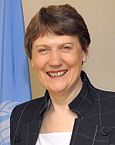Helen Clark: Lecture on The Future We Want – Can We Make it a Reality?
 Sunday, November 9, 2014 at 6:08AM
Sunday, November 9, 2014 at 6:08AM  Helen Clark, UNDPHelen Clark, the Administrator of the United Nations Development Programme (UNDP) gave a lecture on “The Future We Want – Can We Make it a Reality?” in memory of the life and work of Dag Hammarskjold, the 2nd UN Secretary-General, who lost his life in a plane tragedy 50 years ago.
Helen Clark, UNDPHelen Clark, the Administrator of the United Nations Development Programme (UNDP) gave a lecture on “The Future We Want – Can We Make it a Reality?” in memory of the life and work of Dag Hammarskjold, the 2nd UN Secretary-General, who lost his life in a plane tragedy 50 years ago.
Progress on Millennium Development Goals (MDGs)
In reflecting on the Millennium Development goals (MDGs) Helen Clark said that the Millennium Declaration painted a broad canvas and that on development, “the Declaration was specific, and its elements formed the basis of what were to become the MDGs.” These had been widely embraced as global development priorities, aimed to tackle extreme poverty and hunger; protect the environment; expand education; advance health, gender equality, and women’s empowerment; and foster global partnerships for development.
Progress had been made on some MDG targets at the global level including:
- There are hundreds of millions fewer people living in extreme poverty today than there were in 1990 – the baseline date against which progress is measured.
- On average around the world, gender parity in primary education has been achieved, and most children now enroll in a primary school.
- Levels of infant and child mortality have decreased significantly, and there is a downward trend in maternal, tuberculosis, and global malaria deaths. The tide is turning on HIV. The evidence is that the health areas targeted by the MDGs have seen faster progress than would have been expected from the trends existing before 2000.
As Ms Clark said, she was giving a “glass more than half full view of the MDGs.” Progress , however, has been uneven within and between countries, and that the targets set for 2015 did not aim to eradicate extreme poverty and hunger, but only to halve the levels.
Among the obstacles are “a mix of new and old problems” such as:
- War and conflict continue to deny development and human rights to significant numbers of people.
- As extreme poverty has been declining, income inequality has been rising in many countries.
- Threats from environmental degradation, including of our climate, have gathered speed.
- Gender inequality is persistent and pervasive – along with the sexual and gender-based violence which blights the lives of women and girls in societies at war and allegedly at peace.
- The rights of LGBTI people have scarcely registered on the Richter scale in many societies.
- Infectious disease remain a problem with the arrival of Ebola, just as we note the progress in fighting the diseases specified by the MDGs – HIV, malaria, and TB.
Emerging post-2015 development agenda
In discussing the emerging post-2015 development agenda, Ms Clark said that it “looks like being bolder and more transformational than what preceded it.” There is broad agreement that it should be a universal agenda as “development is not just something which happens somewhere else to other people. “
In response to the Secretary-General’s call for “an open, inclusive and transparent consultation process with contributions from a wide range of stakeholders” for shaping the post-2015 development agenda, the UN development system has facilitated “an unprecedented consultation.” National consultations were held in almost 100 countries as well as 11 consultations around major themes, involving civil society, academia, and officialdom, as well as the global on-line MY World survey, on which more than five million people ranked their priorities for the future they want for our world.
The findings from these consultations informed the deliberations of the Open Working Group (OWG) on SDGs, which developed 17 goals and 169 targets. For UNDP, she noted, “it is very significant that the OWG proposal contains a goal on promoting peaceful and inclusive societies, providing access to justice for all, and building effective, accountable, and inclusive institutions. The targets recommended include promoting the rule of law and participatory and representative decision-making, tackling corruption, and promoting and enforcing laws against discrimination. “
In discussing what will make achievement of an ambitious agenda a reality, Helen Clark referred to the Third International Conference on Financing for Development. Its outcome will be critical in enabling agreement to be reached on the SDGs. Funding is considered a central component of what UN Member States refer to as ‘means of implementation’.” She also said, “the availability of official development assistance is still very important for low-income countries in particular, and commitment to ODA at adequate levels is important for building trust in the post-2015 negotiations.” The discussions on financing for development should therefore take into account the wide range of contributions and partnerships.
Setting money aside, Ms Clark also referred to “softer” means of implementation which can help the SDGs to be a success and said that the UN Development Group is currently supporting a second round of consultations on a number of these.
